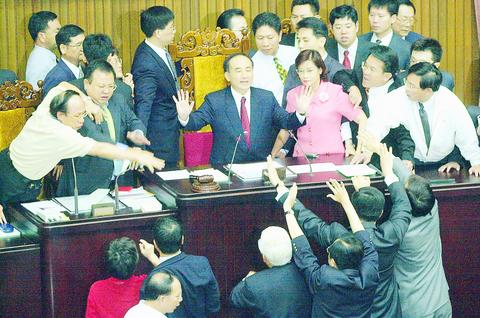Defying all forecasts, a senior presidential adviser won confirmation as Examination Yuan head while his proposed deputy failed to win approval by a wide margin.
Earlier in the day, the legislature also confirmed all 19 nominees for ranking posts in the body, the branch of government responsible for the civil service system.
The outcome, while cheering the DPP, creates a constitutional dilemma for President Chen Shui-bian (

PHOTO: CHIANG YING-YING, TAIPEI TIMES
Meanwhile, the confirmation frustrated the opposition alliance.
KMT Legislative Whip Lin Yi-shih (
Yao Chia-wen (姚嘉文), a former DPP chairman and lawmaker, secured just enough ballots for his nomination as Examination Yuan president after getting the minimum 113 votes needed for confirmation. One legislator voted against him and the other 111 abstained
"I'm glad I did not fail the appointment after all," a beaming Yao said. "As I have said, a few swing votes would decide my fate."
Yao, 64, owed his narrow victory to last-minute defections by a handful of KMT legislators. Earlier, the KMT and PFP had vowed to thwart his appointment, saying his past involvement in DPP and pro-independence activities made him unqualified for the job.
The Constitution stipulates that members of the Examination Yuan should be above partisanship and independently exercise their functions in accordance with law. Yao has said he would quit the DPP and refrain from pro-independence events if he won confirmation.
True to their threats, the opposition parties barred their lawmakers from attending the afternoon vote in an indirect show of disapproval.
As on Thursday, senior mem-bers from the KMT blocked all entrances to the legislative chamber and engaged in sporadic brawls with their DPP colleagues.
KMT Legislator Tseng-Tsai Mei-tso (曾蔡美佐) arrived in the legislature at 5:20pm and was immediately surrounded by fellow lawmakers who sought to prevent her from entering the voting venue.
The blockade drew vehement protests from DPP legislators, including Chou Ching-yu (
"You have no right to deprive her the right to vote," Chou said, struggling to help Tseng break through. "No party can engage in such conduct and call itself democratic."
Tseng later made her way to the chamber but shied away from the balloting boxes. Amid the commotion, four other KMT lawmakers -- Lu Shin-ming (呂新民), Lin Nan-sheng (林南生) Yang Wen-hsin (楊文欣) and Lin Chin-chun (林進春) -- defied the no-show order and cast their ballots.
They were believed to have provided the votes needed for Yao's triumph. The DPP and the TSU control only 102 votes in the 225-seat legislature, insufficient to pass the majority requirement despite the help of seven independent lawmakers.
KMT Aboriginal lawmakers, who attended Thursday's vote, did not show up yesterday afternoon. Caucus officials said they went hunting in the mountains together.
To the surprise of many, former interior minister Chang Po-ya (張博雅) obtained only 102 ballots, 11 short of the number needed to be confirmed as Examination Yuan vice president.
Chang, 60, now a national policy adviser, insisted that many opposition lawmakers backed her nomination but abstained from the vote at the behest of their caucuses.
"Had they participated, the result would be different," she said.

‘WIN-WIN’: The Philippines, and central and eastern European countries are important potential drone cooperation partners, Minister of Foreign Affairs Lin Chia-lung said Minister of Foreign Affairs Lin Chia-lung (林佳龍) in an interview published yesterday confirmed that there are joint ventures between Taiwan and Poland in the drone industry. Lin made the remark in an exclusive interview with the Chinese-language Liberty Times (the Taipei Times’ sister paper). The government-backed Taiwan Excellence Drone International Business Opportunities Alliance and the Polish Chamber of Unmanned Systems on Wednesday last week signed a memorandum of understanding in Poland to develop a “non-China” supply chain for drones and work together on key technologies. Asked if Taiwan prioritized Poland among central and eastern European countries in drone collaboration, Lin

The US government has signed defense cooperation agreements with Japan and the Philippines to boost the deterrence capabilities of countries in the first island chain, a report by the National Security Bureau (NSB) showed. The main countries on the first island chain include the two nations and Taiwan. The bureau is to present the report at a meeting of the legislature’s Foreign Affairs and National Defense Committee tomorrow. The US military has deployed Typhon missile systems to Japan’s Yamaguchi Prefecture and Zambales province in the Philippines during their joint military exercises. It has also installed NMESIS anti-ship systems in Japan’s Okinawa

The Chien Feng IV (勁蜂, Mighty Hornet) loitering munition is on track to enter flight tests next month in connection with potential adoption by Taiwanese and US armed forces, a government source said yesterday. The kamikaze drone, which boasts a range of 1,000km, debuted at the Taipei Aerospace and Defense Technology Exhibition in September, the official said on condition of anonymity. The Chungshan Institute of Science and Technology and US-based Kratos Defense jointly developed the platform by leveraging the engine and airframe of the latter’s MQM-178 Firejet target drone, they said. The uncrewed aerial vehicle is designed to utilize an artificial intelligence computer

Renewed border fighting between Thailand and Cambodia showed no signs of abating yesterday, leaving hundreds of thousands of displaced people in both countries living in strained conditions as more flooded into temporary shelters. Reporters on the Thai side of the border heard sounds of outgoing, indirect fire yesterday. About 400,000 people have been evacuated from affected areas in Thailand and about 700 schools closed while fighting was ongoing in four border provinces, said Thai Rear Admiral Surasant Kongsiri, a spokesman for the military. Cambodia evacuated more than 127,000 villagers and closed hundreds of schools, the Thai Ministry of Defense said. Thailand’s military announced that